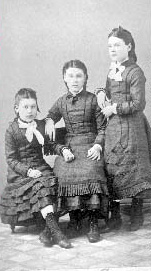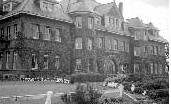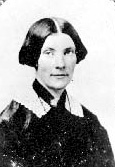
| Introduction | Victorian Childhood | Philanthropy | BC Protestant Orphans' Home | References | Site Information |
Alone, in the dreary
pitiless street,
With my torn old dress
and bare cold feet,
All day I wandered
to and fro,
Hungry and shivering
and nowhere to go
Nobody's Child
A poem by P.H. Case
1867 [1]
A poem by P.H. Case
1867 [1]
VICTORIAN CONCEPTS OF CHILDHOOD
The
concept of childhood began to change during the 19th century and by the
end of the Victorian era the sphere of 'childhood' was viewed by the
middle class as quite separate from that of the adult world.
Earlier generations of children had been exposed to the hardships
and responsibilities of adult life but a new shift in attitude created
an expectation that a child's life should be one of innocence and
dependence.
This 19th shift in attitude was due in part to the industrialization and urbanization of England. Children who had once laboured on the land in small communities were increasingly employed in factories as their working class parents sought the economic opportunities of the cities. Working and living conditions for the working classes grew increasingly harsh and the social reform acts of the later 19th century attempted to improve the lives of the working poor.[2] Philanthropists and social reformers, motivated by their Christian values and middle class ideals played a significant role in bringing about change.
Reformers viewed the living conditions of many working class children as unacceptable. Children, they believed, should be protected from physical harm, moral corruption and the responsibilities of adult life and "every child should have a childhood". [3]
Orphanages were established to care for the children removed from unfit parents or those who had been abandoned or orphaned. All faiths were active in this process including the Protestant churches. The intentions of the reformers was sincere, but it is argued by Rooke and Schnell in their book Discarding the Asylum that these values were imposed upon the working class and that the reformers' understanding of the social structure was often comprimised by their own simple view of the world. Children were rescued from family situations deemed by the reformers to be unfit and were institutionalized for their own protection.
In Victoria the sudden increase in population from the gold rush of 1858 brought social problems including those involving child welfare. In April 1872, the editor of the Daily Colonist challenged the city to help with the problem of abandoned and destitute children. [4] A grand fete and bazaar was held by the Catholic Sisters of St Ann and the community was encouraged to join the effort regardless of faith.
Edward and Mary Cridge, together with Senator and Mrs MacDonald and the leaders of the Protestant churches, answered this call. For Mary Cridge, her compassion to help those in need was fundamental to her middle class Protestant upbringing but was perhaps greater as a result of losing children of her own to illness. A teacher and mother, Mary Cridge was motivated by her faith in God to improve the lives of Victoria's destitute children. [5]
A letter from Mary Cridge to an orphan wishing to leave the Home and seek employment after ten years in the orphanage illustrates her faith.
Sources
1 Gail Corbett, Barnardo Children in Canada (Peterborough: Woodland Publishing, 1981).
2 Paul Knaplund. The British empire, 1815-1939, (New York: Harper, c1941).
3 Patricia Rooke & R.L. Schnell. Discarding the Asylum ( London: University Press of America Inc., 1983).
4 Cridge Centre fonds, City of Victoria Archives
5 Vernon Storey et al. The Home. Orphans' Home to Family Centre 1873 - 1998. (Victoria: The Cridge Centre for the Family, 1999).
6 Protestant Orphans' Home fonds, 1883-1926. BC Archives, N/C/B77
This 19th shift in attitude was due in part to the industrialization and urbanization of England. Children who had once laboured on the land in small communities were increasingly employed in factories as their working class parents sought the economic opportunities of the cities. Working and living conditions for the working classes grew increasingly harsh and the social reform acts of the later 19th century attempted to improve the lives of the working poor.[2] Philanthropists and social reformers, motivated by their Christian values and middle class ideals played a significant role in bringing about change.
Reformers viewed the living conditions of many working class children as unacceptable. Children, they believed, should be protected from physical harm, moral corruption and the responsibilities of adult life and "every child should have a childhood". [3]
Orphanages were established to care for the children removed from unfit parents or those who had been abandoned or orphaned. All faiths were active in this process including the Protestant churches. The intentions of the reformers was sincere, but it is argued by Rooke and Schnell in their book Discarding the Asylum that these values were imposed upon the working class and that the reformers' understanding of the social structure was often comprimised by their own simple view of the world. Children were rescued from family situations deemed by the reformers to be unfit and were institutionalized for their own protection.
In Victoria the sudden increase in population from the gold rush of 1858 brought social problems including those involving child welfare. In April 1872, the editor of the Daily Colonist challenged the city to help with the problem of abandoned and destitute children. [4] A grand fete and bazaar was held by the Catholic Sisters of St Ann and the community was encouraged to join the effort regardless of faith.
Edward and Mary Cridge, together with Senator and Mrs MacDonald and the leaders of the Protestant churches, answered this call. For Mary Cridge, her compassion to help those in need was fundamental to her middle class Protestant upbringing but was perhaps greater as a result of losing children of her own to illness. A teacher and mother, Mary Cridge was motivated by her faith in God to improve the lives of Victoria's destitute children. [5]
A letter from Mary Cridge to an orphan wishing to leave the Home and seek employment after ten years in the orphanage illustrates her faith.
Remember dear
child our wish is that you may be happy and useful and you will be if
you go where God directs. [6]
Sources
1 Gail Corbett, Barnardo Children in Canada (Peterborough: Woodland Publishing, 1981).
2 Paul Knaplund. The British empire, 1815-1939, (New York: Harper, c1941).
3 Patricia Rooke & R.L. Schnell. Discarding the Asylum ( London: University Press of America Inc., 1983).
4 Cridge Centre fonds, City of Victoria Archives
5 Vernon Storey et al. The Home. Orphans' Home to Family Centre 1873 - 1998. (Victoria: The Cridge Centre for the Family, 1999).
6 Protestant Orphans' Home fonds, 1883-1926. BC Archives, N/C/B77
Related topics

The Cridge's own children
Maude, Rhoda & Lillie, c1865
(BC Archives A-01209)
top of page

BC POH, c1900
(BC Archives D-03597)
top of page

Mary Cridge
(BC Archives A-01304)
top of page
© 2007 All Rights Reserved
[HOME] [VICTORIAN CHILDHOOD] [PHILANTHROPY] [ORPHANS' HOME]
[REFERENCES] [SITE INFO]